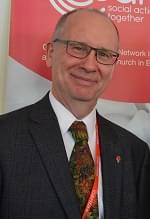By Eddie Gilmore, Chief Executive, Irish Chaplaincy (CSAN member organisation), following the death of Jean Vanier (10 September, 1928 – 7 May, 2019)
As I was told of the death, at the age of 90, of Jean Vanier, founder of L’Arche, there immediately came to mind my favourite story connected with him: an important story for me, and one which I discovered years later from Jean I’d actually misheard!
Jean was a son of Georges Vanier, a Governor-General of Canada, and he crossed the Atlantic at the height of the Second World War to join the British Naval College at Dartmouth. After the War, one of his tasks, together with a fellow young naval cadet, was to ‘entertain’ the young princesses Elizabeth and Margaret on a long sea voyage to South Africa. I was touched to hear that when Jean went to Buckingham Palace in recent years to collect an award from the now Queen Elizabeth she said to him, “Hello Jock”, this being the name that those close to him used when he was growing up.
From this rather privileged background, Jean found himself in 1964 in a village called Trosly in the North of France, moving into a dilapidated old house with two men, Raphael and Philippe, whom he had met and befriended at a large institution, and whom he had invited to come and live with him. The house was named L’Arche, French for the ark, and it would grow into a worldwide network of 150 communities in almost 40 countries, where people with and without learning disabilities live and work and share life together. I joined the L’Arche community in Canterbury in 1988 and was there for 28 years, and it’s where I met my wife, so I have a particular reason to be grateful for what Jean started.
In 2006 I was attending an event in Trosly for directors of L’Arche communities in Europe, at which Jean spoke to us. In one of his talks he recalled how he’d been visiting a prison in America where one of the guys had told him proudly (or at least this is what I heard at the time), “I’m the best card-dealer in the State of Virginia”. Jean went on to say, “You know, we all need to be the best something; but where do I want to choose to be the best?” I interpreted this as meaning, ‘Where do I want to choose to use my gifts?’ At that time I was coming to the end of my initial 4 year ‘mandate’ as Director and unsure whether or not to continue for a second 4 year term, but this story inspired me to do so.
I told this story often to people, and I hoped I’d have a chance one day to say thank you to Jean. Years later I drove a full minibus of people from L’Arche Kent over to Trosly to visit Jean, whom we knew could be in his final years. It was never easy to get to speak to him one-to-one, but following Mass in the lovely converted barn of a chapel, I spotted that he was momentarily on his own in the courtyard, and seized my chance. I went over and said I wanted to thank him for something he’d said years earlier that had been very important for me. “Oh yes”, he replied, “what was that?” I said he’d been speaking about the man in a prison who claimed to be the best card-dealer in the State of Virginia. “No, no, no!” said Jean, “the best car-stealer in the state penitentiary”! And we both roared with laughter.
God bless you Jean, and Thank You.


You must be logged in to post a comment.